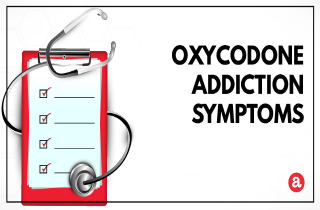How can you tell if you are addicted to oxycodone, or not?
In the following article we’ll take a look at the main signs and the symptoms of oxycodone addiction, what to look for in a loved one, and your options for treatment. Stay with us, we welcome your questions and comments at the end.
Oxycodone addiction signs
Addiction to oxycodone is identified as a cluster of physiological, behavioral, and cognitive phenomena, where the use of oxycodone is the highest priority. Three (3) main signs of addiction include:
1. Loss of control of use patterns
2. Continued use despite negative consequences
3. Cravings, or compulsion to use
The desire to take oxycodone, or also known as craving, is manifested by preoccupation to obtain the drug and persistent drug-seeking behavior. The cravings can basically drive you to do things you wouldn’t normally do and can become the central drive in life.
Still, the consequences of addiction to oxycodone may be biological, psychological and/or social. If you spot any of the following changes in these areas, then you or a loved one may be addicted. Getting help early results in better outcomes, so be on the lookout for…
Behavioral signs
- Giving up hobbies, sports, and socializing
- Legal trouble related to fights, accidents, or DUI
- Neglecting responsibilities at work, school, or home (including kids)
- Relationship difficulties
- Secretive or suspicious behaviors
- Sudden change in friends or favorite hangouts
- Unexplained need for money or financial problems
Physical signs
- Appetite – decreases or increases that are not normal
- Coordination – impaired coordination or slurred speech
- Hygiene – not caring about appearance
- The eyes – bloodshot or large/small pupils
- The nose – runny or sniffling a lot
- Sleep patterns – sleeping too much or too little
- Smells – unusual odors on breath, body, or clothing
Psychological signs
- Abnormal excitement – increased energy, nervousness, or instability
- Anxiety – displaying unusual fear or paranoia with no reason
- Mood swings – from euphoria to irritability to anger
- Motivation – low energy, appearing tired or “spaced out”
- Personality – unexplained changes in personality or attitude
Symptoms of oxycodone addiction
The DSM – Diagnostic and Statistical Manual of Mental Disorders– outlines clinical criteria for oxycodone addiction and provides the framework for health providers to identify and scale the level of drug addiction, according to certain symptoms. For oxycodone – an opioid class of drug – these symptoms can include:
- A great deal of time spent in activities necessary to obtain, use, or recover from the effects of oxycodone.
- Continued use despite persistent or recurrent social or interpersonal problems.
- Continued use despite knowing that you have a persistent or recurrent physical or psychological problem.
- Failure to fulfill major role obligations at work, school, or home
- Giving up important social, occupational, or recreational activities
- Oxycodone is taken in larger amounts or over a longer period than intended.
- Persistent desire or unsuccessful efforts to cut down or control use.
- Recurrent use in physically hazardous situations.
- Withdrawal syndrome or taking other opioids (or a closely related substance) to relieve/avoid withdrawal symptoms.
- Tolerance, which is the need for increased amounts of oxycodone to achieve intoxication or desired effect, also observed as diminished effect with continued use of the same amount.
- Oxycodone addiction symptoms: Can they be treated?
Addiction to oxycodone is a frequent outcome for drug abusers, because of the way oxycodone works in the brain. We like the way it makes us feel. It changes brain chemistry over time. And once physically hooked, our poor decision making skills and low tolerance to pain can keep us in a cycle of use.
Medically managed drug treatment has proven to be an effective way to treat addiction to drugs like oxycodone. Using drugs containing buprenorphine (Suboxone and Subutex), methadone, or nalterxone can significantly make successful detox and abstinence possible. These drugs can prevent oxycodone withdrawal, decrease cravings and block oxycodone effects in the event of a relapse.
Still, medication-assisted drug treatment must be accompanied by psychotherapy and/or behavioral therapy for best results. For oxycodone addiction treatment to be successful, both physical and psychological dependency issues must be addressed concurrently.
How can I help a loved one?
There are any ways that you can help a oxycodone addict. One of them is to plan an intervention. By initiating a research on the available addiction treatment programs in your area, and sharing personal experience about the addicts state, you will enable the addicts awareness for the consequences of oxycodone use. Also, look into the CRAFT model for family awareness and education. This 12-16 week family counseling method can increase chances of motivating change for a loved one.
Oxycodone addiction questions
Still have questions about the signs of addiction? We’ve tried our best to outline the main diagnostic and observable criteria here. But if you do have a particular question, please feel free to post them in the comments section below. We always try to provide personal, accurate and fast answers to our readers questions…or we’ll refer you to someone who can help.









Related Posts